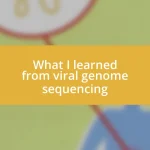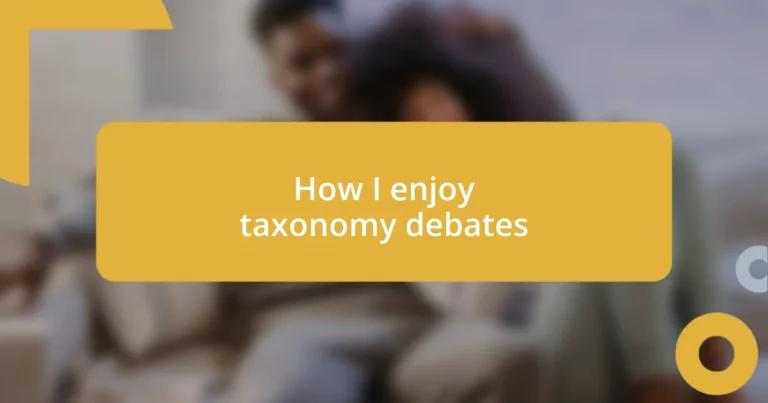Key takeaways:
- Taxonomy debates reveal diverse perspectives shaped by individual experiences and biases, emphasizing the complexity of classifying organisms.
- Engaging in discussions fosters critical thinking, broadens perspectives, and enhances communication skills, leading to personal and professional growth.
- Preparation and a mindset of curiosity are essential for productive participation in debates, allowing for meaningful exchanges and cooperative learning.
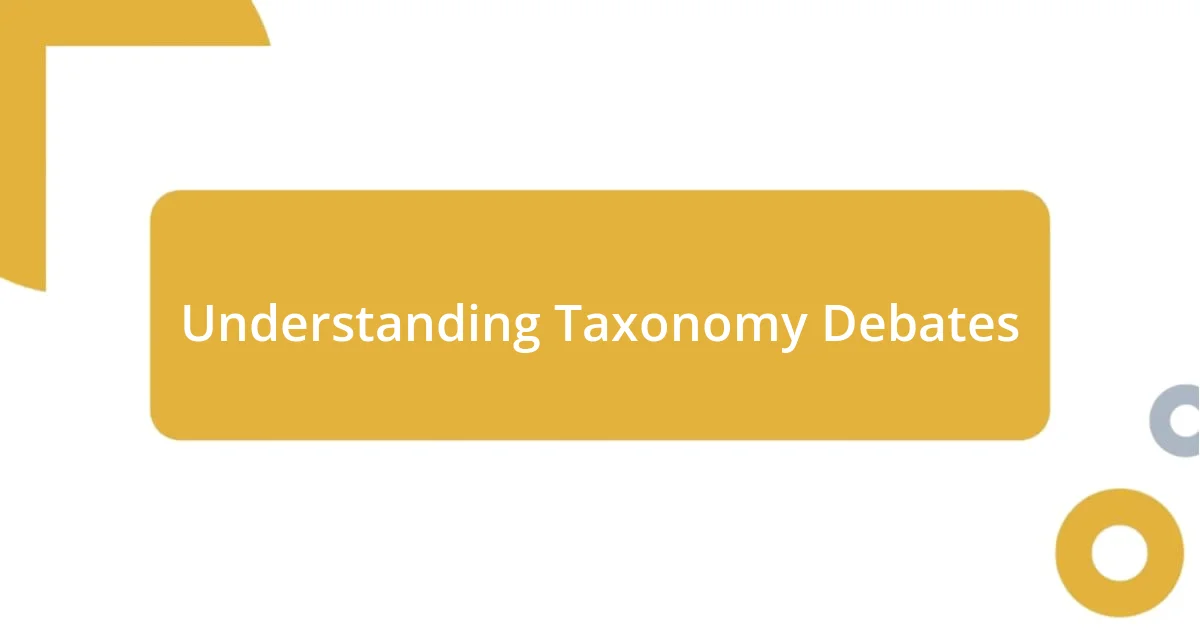
Understanding Taxonomy Debates
Taxonomy debates can sometimes feel akin to a lively family argument where everyone brings their own opinions and experiences to the table. I remember a particular conference where several experts passionately defended their classifications, leaving me both excited and overwhelmed. It struck me that these debates are not just about names and categories; they reflect diverse perspectives shaped by years of research and personal insights.
When I dive into taxonomy discussions, I often find myself fascinated by how different scientists perceive the same species. Isn’t it intriguing to think that a single organism can take on various identities, each highlighting different traits or evolutionary histories? I once encountered a biologist who specialized in the same insect family I was studying, yet our classifications differed significantly. This sparked a productive exchange that opened my eyes to nuances I’d never considered before.
Understanding taxonomy debates means accepting that there isn’t always a single “correct” perspective. Have you ever thought about how our own biases might influence our categorization? I realized this during a heated debate in a study group, where my inclination to group organisms based on morphology clashed with another member’s focus on genetic analysis. This dynamic illuminated the rich tapestry of scientific knowledge, illustrating that various viewpoints can coexist and lead us to a deeper understanding of the natural world.
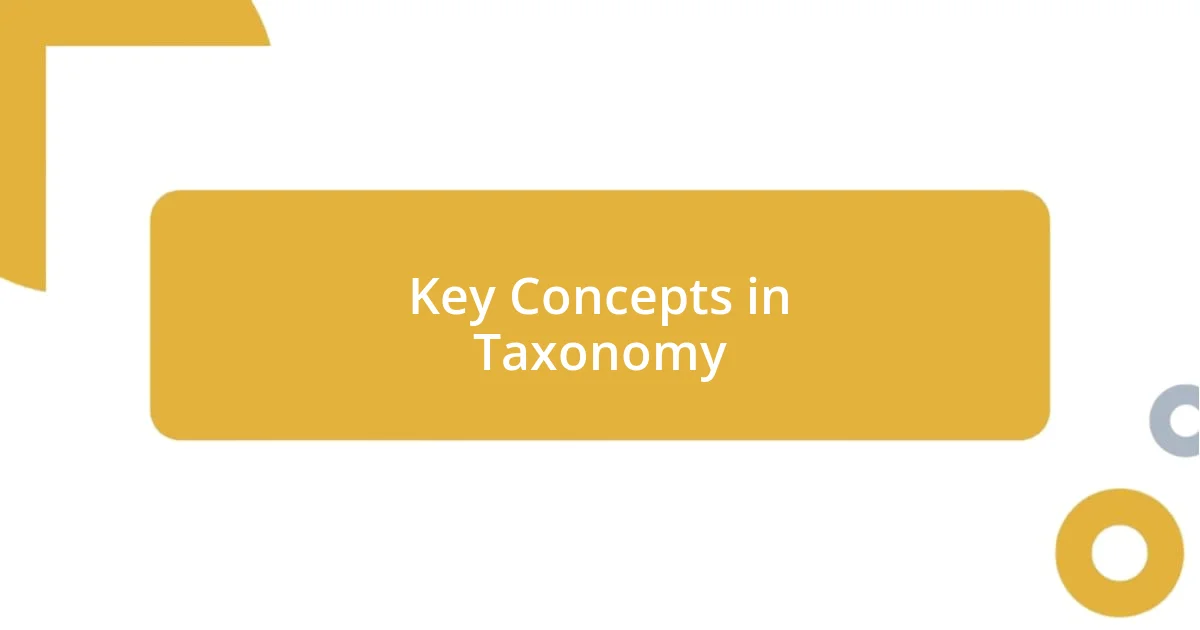
Key Concepts in Taxonomy
Taxonomy isn’t just about categorizing organisms; it encompasses key concepts that shape our understanding of biodiversity. For instance, the concept of phylogenetics, which analyzes evolutionary relationships, has revolutionized how we view species classification. I recall being deeply fascinated during a lecture about cladistics, where the speaker elegantly traced lineages like a family tree, reigniting my passion for understanding the connections between life forms.
Another vital aspect is the difference between traditional and modern taxonomy. Traditional taxonomy often relies on morphological traits like size, shape, or color, while modern approaches increasingly incorporate genetic data. My experience volunteering in a local biodiversity project highlighted this shift: we used both methods to catalog species in our region, revealing how genetic insights could resolve longstanding classification disputes.
Finally, the concept of taxonomic hierarchy is crucial — it organizes life into ranks such as kingdom, phylum, class, and so forth. I remember grappling with this hierarchy when working on my own research project; simplifying the vast diversity into clear ranks was both a challenge and a rewarding puzzle. It made me truly appreciate how interconnected life is and the importance of clear communication in taxonomy debates.
| Concept | Description |
|---|---|
| Phylogenetics | Study of evolutionary relationships among species. |
| Traditional vs Modern Taxonomy | Traditional relies on physical traits; modern includes genetic data. |
| Taxonomic Hierarchy | Systematic organization of life forms into ranks. |
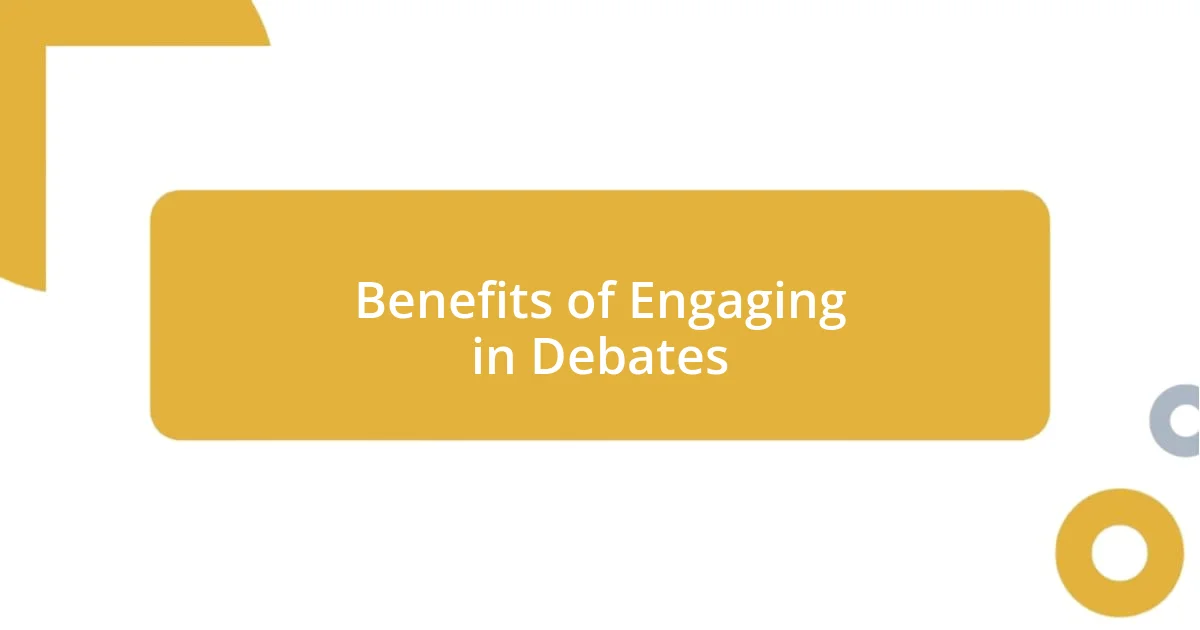
Benefits of Engaging in Debates
Engaging in debates has a wealth of benefits that go beyond mere discussion. It’s like stepping into an arena where ideas clash, and in doing so, we sharpen our own perspectives. I often find that when I participate in debates, whether casually or in structured settings, my thought processes become more articulate and nuanced. It can be thrilling to express a viewpoint, especially when challenged. I remember a time when a fellow researcher challenged my stance on a particular classification. Initially taken aback, I found my passion ignited to defend my perspective, pushing me to delve deeper into my research. This not only enhanced my understanding but also encouraged me to appreciate alternative viewpoints.
The advantages of engaging in debates include:
- Enhanced Critical Thinking: Debates require us to analyze our own ideas and those of others critically.
- Broader Perspectives: Exposure to differing opinions helps us recognize the multifaceted nature of taxonomy.
- Improved Communication Skills: Articulating arguments effectively can lead to greater clarity in communicating complex concepts.
- Networking Opportunities: Debating can connect you with like-minded individuals and experts in the field.
- Personal Growth: Challenging discussions can help shape and refine our beliefs over time.
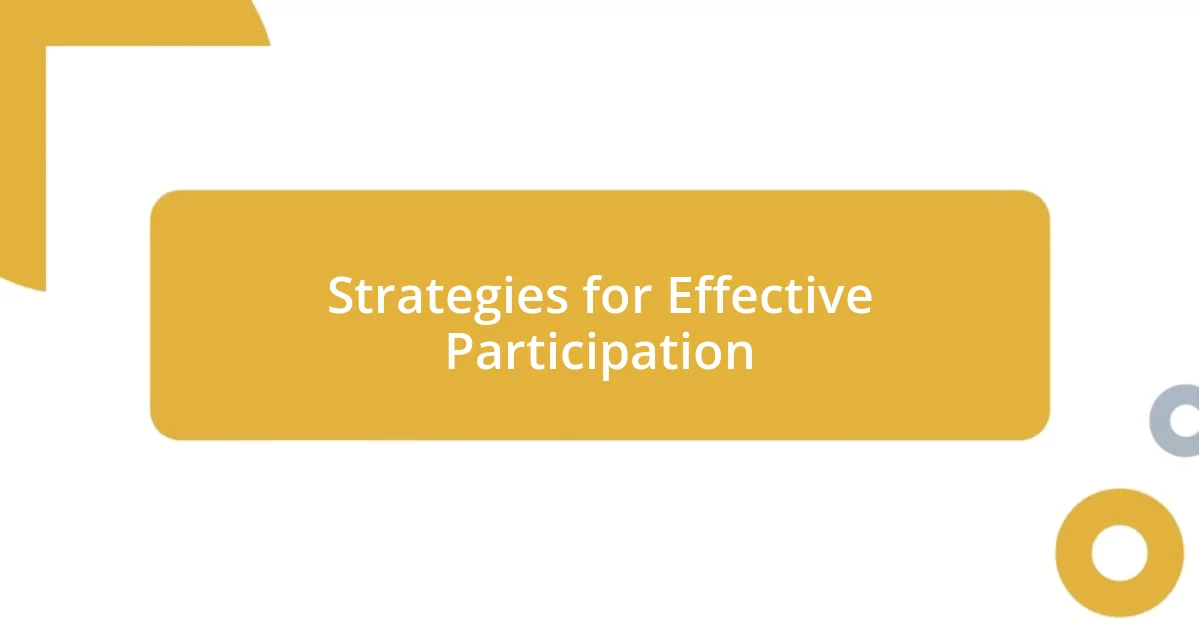
Strategies for Effective Participation
One of the most effective strategies for participating in taxonomy debates is to come prepared with a solid understanding of the key concepts. I vividly recall preparing for a heated discussion on the merits of molecular data versus traditional morphology in species classification. It took hours of reading and reviewing case studies, but arriving equipped with evidence made me feel more confident. Do you think being well-prepared influences the quality of your contributions? I believe it absolutely does.
Engaging actively in discussions is also essential. I remember a session where I hesitated to voice my thoughts, thinking they might not be well-received. But once I took the plunge and shared my insights on phylogenetic trees, the energy of the room shifted. Suddenly, I felt a wave of camaraderie as others chimed in, building on my points. Asking questions or seeking clarifications can also create a more dynamic atmosphere, encouraging others to participate too. Have you found that asking a genuine question can lead to richer conversations?
Lastly, fostering an open mindset is crucial. One time, during a debate about taxonomic hierarchies, I was challenged to rethink my stance on the importance of genetic data in classification. Rather than clinging to my original beliefs, I decided to listen and consider the alternative perspectives. This willingness to adapt not only expanded my knowledge but also helped build connections with others in the discussion. Embracing differing views can transform debates from confrontations into collaborative explorations. How often do we close ourselves off from new information because we fear being wrong? It’s a humbling realization, but one that can broaden our horizons immeasurably.
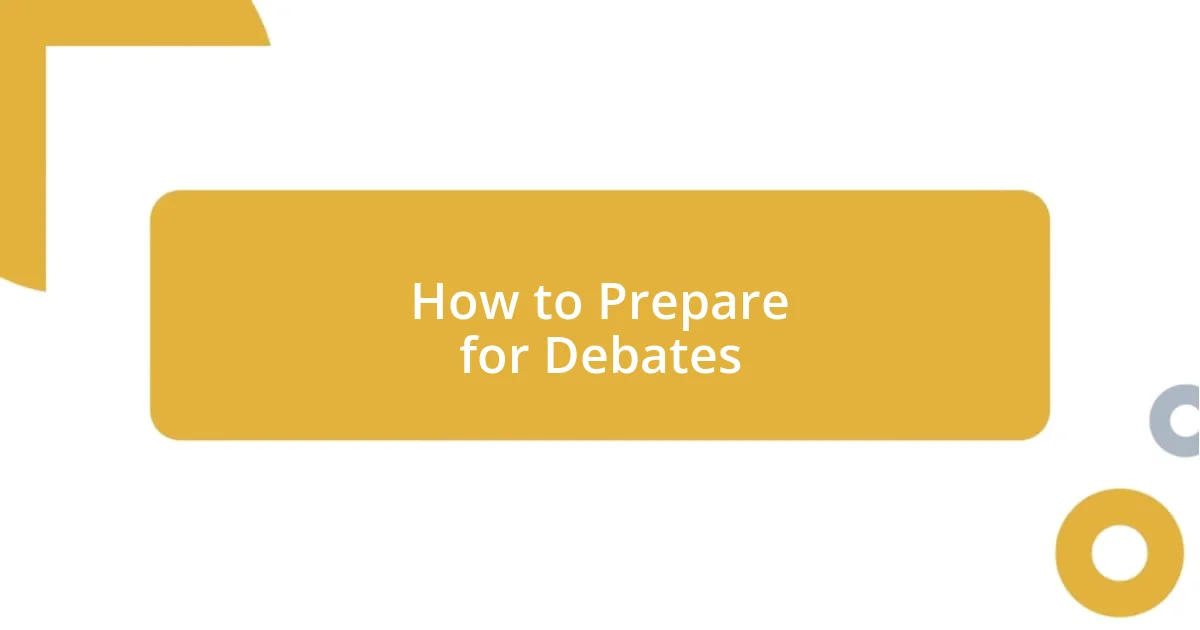
How to Prepare for Debates
Preparation is key to making the most out of any debate. I’ve found that thoroughly researching your topic allows you to enter the discussion with confidence, which is truly empowering. For example, before a recent debate on the implications of taxonomy in conservation practices, I spent days combing through literature, preparing notes, and even jotting down potential counterarguments. Isn’t it interesting how that level of prep not only helps articulate your own points but also prepares you to respond effectively?
In addition to research, practicing your delivery is invaluable. I remember standing in front of a mirror, rehearsing my arguments for hours before an important debate. It felt silly at first, but seeing my expressions and hearing my tone helped me refine my message. I also recommend finding someone to practice with—maybe a friend or a colleague—so you can simulate a real debate environment. This feedback loop can be incredibly useful; don’t you agree?
Lastly, it’s essential to foster a mindset of curiosity. Instead of simply focusing on winning the argument, think of each debate as an opportunity to learn. During one discussion about ecological classification, I initially wanted to dominate the conversation. However, when I shifted my focus to understanding the differing opinions, I ended up learning more than I ever expected. This curiosity transformed the debate from a showdown into a collaborative exchange. So, how often do we get so caught up in proving ourselves right that we forget to listen? It’s a challenge, but one that ultimately enriches our debate experience.
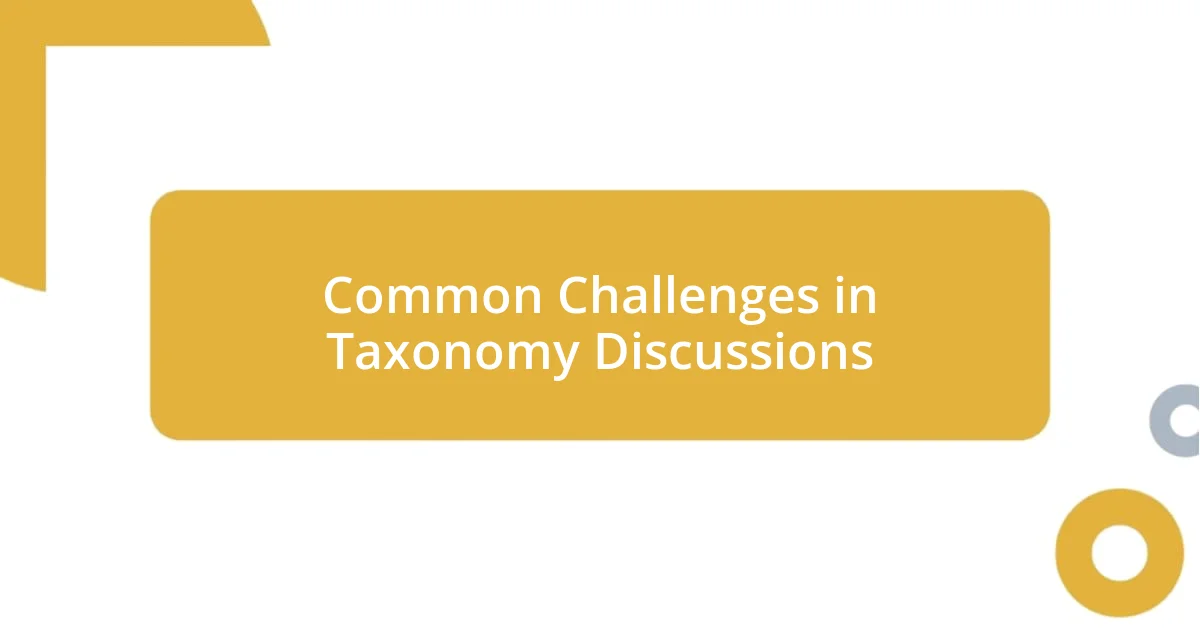
Common Challenges in Taxonomy Discussions
Taxonomy discussions often hit roadblocks due to differing terminologies and the lack of consensus on definitions. I recall a specific debate where participants used various terms, such as “clade” and “taxon,” which sounded similar but had distinct meanings in our context. It was frustrating to see people misunderstand each other simply because we weren’t on the same page. Have you ever been in a conversation where a single word derailed the entire discussion? It’s a reminder of the importance of clarity in our discourse.
Another common challenge is the emotional attachment some people have to their classifications. I’ve experienced moments where my well-researched viewpoint on classification methods was met with defensiveness. The tension in the room was palpable. It’s fascinating to me how these personal stakes can overshadow the drive for objective analysis. How can we navigate that emotional landscape while still fostering a productive dialogue? I believe it requires deliberate efforts to create a respectful environment where vulnerability can coexist with critique.
Lastly, the accessibility of data plays a significant role in these debates. There was a time when I struggled to make sense of complex datasets on genetic markers. I mean, who hasn’t felt lost in the sea of information? My frustration turned into motivation, and I dove deep into learning about the methodologies used for data collection and analysis. This journey made a difference not just in my understanding but also in my ability to engage others. Isn’t it interesting how turning challenges into learning opportunities can enhance our discussions?
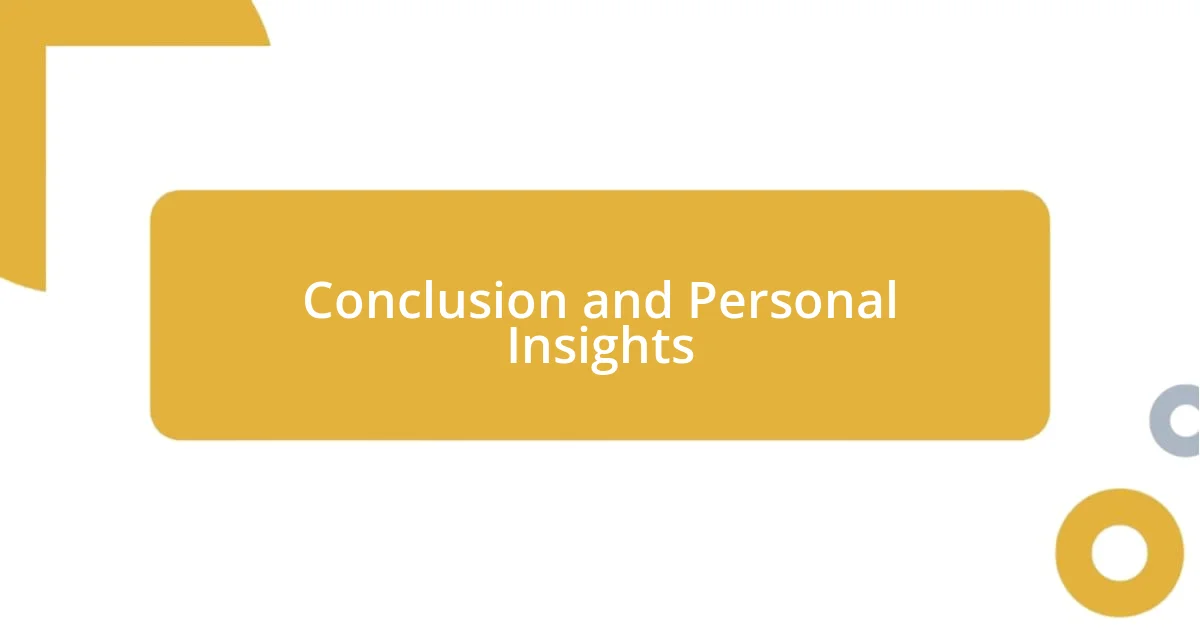
Conclusion and Personal Insights
Engaging in taxonomy debates has fundamentally shaped my understanding of the subject. I’ve realized that these conversations are more than just exchanges of views; they are vibrant explorations of knowledge. Reflecting on my experiences, I can’t help but appreciate how these discussions sharpen critical thinking. Have you ever left a debate feeling clearer about your own thoughts? I know I have, and that’s a rewarding aspect of engaging with differing opinions.
Interestingly, I often find that the emotional stakes invested in taxonomy discussions can lead to profound revelations. I remember a moment when a fiercely held classification was challenged, and rather than feeling defensive, I chose to lean into the discomfort. This shift was eye-opening; it allowed me to appreciate the intricate balance between passion and open-mindedness. Isn’t it intriguing how vulnerability can be a catalyst for deeper learning?
Ultimately, what I cherish most about these debates is the community built around them. Through shared challenges and explorations, I’ve forged connections with like-minded individuals who respect diverse perspectives. There’s a unique energy that surfaces when minds come together, isn’t there? It’s in these interactions I find a collective commitment to progression, driving us all to become more informed and empathetic participants in the world of taxonomy.



